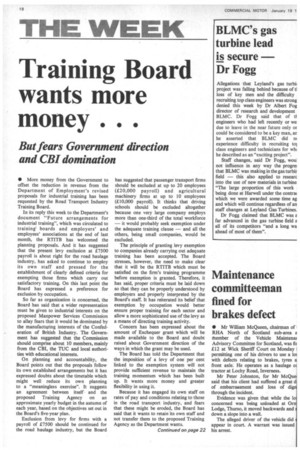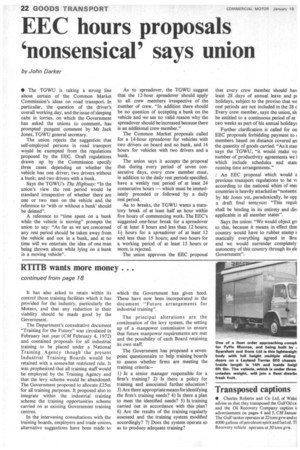Training Board wants more
Page 20

Page 24

If you've noticed an error in this article please click here to report it so we can fix it.
money...
But fears Government direction and CBI domination
• More money from the Government to offset the reduction in revenue from the Department of Employment's revised proposals for industrial training has been requested by the Road Transport Industry Training Board.
In its reply this week to the Department's document "Future arrangements for industrial training", which was circulated to training boards and employers' and employees' associations at the end of last month, the RTITB has welcomed the planning proposals. And it has suggested that the present levy exclusion at £7500 payroll is about right for the road haulage industry, has asked to continue to employ its own staff and pressed for the establishment of clearly defined criteria for exempting those firms which carry out satisfactory training. On this last point the Board has expressed a preference for exclusion by occupation.
So far as organization is concerned, the Board has said that a wider representation must be given to industrial interests on the proposed Manpower Services Commission to allay fears that it would be dominated by the manufacturing interests of the Confederation of British Industry. The Government has suggested that the Commission should comprise about 10 members, mainly from the CBI, the TUC and local authorities with educational interests.
On planning and accountability, the Board points out that the proposals follow its own established arrangements but it has expressed doubts about the timetable which might well reduce its own planning to a "meaningless exercise". It suggests an agreement between itself • and the proposed Training Agency on an approximate yearly budget in the autumn of each year, based on the objectives set out in the Board's five-year plan.
Exclusion from levy for firms with a payroll of £7500 should be continued for the road haulage industry, but the Board has suggested that passenger transport firms should be excluded at up to 20 employees (£20,000 payroll) and agricultural machinery firms at up to 10 employees (£10,000 payroll). It thinks that driving schools should be excluded altogether because one very large company employs more than one-third of the total workforce — it would probably seek exemption under the adequate training clause — and all the others, being small companies, would be excluded.
The principle of granting levy exemption to companies already carrying out adequate training has been accepted. The Board stresses, however, the need to make clear that it will be the RTITB which must be satisfied on the firm's training programme before exemption is granted. Therefore, it has said, proper criteria must be laid down so that they can be properly understood by employers and properly interpreted by the Board's staff. It has reiterated its belief that exemption by occupation would better ensure proper training for each sector and allow a more sophisticated use of the levy as a means of directing training activity.
Concern has been expressed about the amount of Exchequer grant which will be made available to the Board and doubt raised about Government direction of the ways in which the grant may be used.
The Board has told the Department that the imposition of a levy of one per cent linked to the exemption system will not provide sufficient revenue to maintain the training momentum which has been built up. It wants more money and greater flexibility in using it.
Because it has engaged its own staff on rates of pay and conditions relating to those in the road transport industry, and fears that these might be eroded, the Board has said that it wants to retaidits own staff and not transfer them to the proposed Training Agency as the Department wants. It has also asked to retain within its control those training facilities which it has provided for the industry, particularly the Motecs, and that any reduction in their viability should be made good by the Government.
The Department's consultative document "Training for the Future" was circulated in February last year (CM February 4, 1972) and contained proposals for all industrial training to be placed under a National Training Agency though the present Industrial Training Boards would be retained with a somewhat restricted role. It was prophesized that all training staff would be employed by the Training Agency and that the levy scheme would be abandoned. The Government proposed to allocate £25m for all training purposes. It proposed also to integrate within the industrial training scheme the training opportunities scheme carried on at existing Government training centres.
In the intervening consultations with the training boards, employers and trade unions, alternative suggestions have been made to which the Government has given heed. These have now been incorporated in the document "Future arrangements for industrial training".
The principal alterations are the continuation of the levy system, the setting up of a manpower commission to ensure that future manpower requirements are met and the possibility of each Board retaining its own staff.
The Government has proposed a sevenpoint questionnaire to help training boards to assess whether firms are meeting the training criteria: 1) Is a senior manager responsible for a firm's training? 2) Is there a policy for training and associated further education? 3) Are there appropriate means for identifying the firm's training needs? 4) Is there a plan to meet the identified needs? 5) Is training carried out in accordance with this plan? 6) Are the results of the training regularly assessed and the training system modified accordingly? 7) Does the system operate so as to produce adequate training?




















































































































